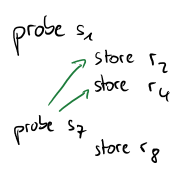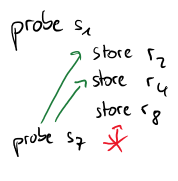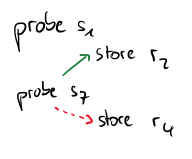
Given a store $R_i$ with arriving probe tuples $s_1, \dots, s_n$. The timestamps of these each tuple should coincide with index. This means, ideally the tuples would arrive in order at the store as depicted here:

First, $s_1$ is sent there to probe against previously stored tuples. However there are none, so there’s no join result for $s_1 \Join R_i$. Then, $r_2$ and $r_4$ arrive at the store and are placed there for later use. Now, when $s_7$ arrives, it finds $r_2$ and $r_4$ and can join with them (green markers), producing $s_7 \Join \{r_2, r_4\}$. Finally, $r_8$ is also placed in the buffer.
What if a probe comes late? For example, let $s_7$ arrive after the tuple $r_8$ as here:

As before, $s_7$ joins with $r_2$ and $r_4$) (green markers), however, $s_7$ must not be joined with $r_8$ (red marker). Why? Because at the same time, at some $S$-store, $s_7$ was already stored and $r_8$ will arrive as a probe and there the join result $s_7 \Join r_8$ will be produced.
Thus, a probed tuple is only probed against all stored tuples with a timestamp smaller than that tuple.
What if a store comes late? For example, if probe $s_7$ arrives before store $r_4$ like here:

Then the current store is according to our model responsible for generating the join between $s_7$ and $r_4$. However, it only knows of $r_2$ and can produce that join (green marker). So, the store has to buffer $s_7$ up to the point later when $r_4$ arrives, in order to compute that join (red marker).
From a high level, the implementation looks like this:
class Storage {
{field} local storage
{field} probe buffer
List<Tuple> store(Tuple)
List<Tuple> probe(Tuple)
}
When a store tuple arrives, sm.store(tuple) is called, tuple is placed in the local storage and the join result with all “later” tuples from the probe buffer is returned. Vice versa, when a probe tuple arrives, sm.probe(tuple) is called, tuple is placed in the probe buffer and the join result with all previous tuples from the local storage is returned.
The class Joiner subsumes storing of documents as well as joining and handling delayed joins. Thus, it internally consists of a ProbeBuffer and a StoreBuffer (see there for documentation). The StoreBuffer handles normal joins as well as delayed probes. The ProbeBuffer handles delayed stores.